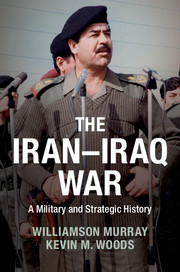Book contents
- Frontmatter
- Dedication
- Contents
- List of figures
- List of tables
- Preface
- Acknowledgments
- Note to reader
- 1 Introduction
- 2 A context of “bitterness and anger”1
- 3 The opponents
- 4 1980: The Iraqi invasion begins
- 5 1981–1982: Stalemate
- 6 Defeat and recovery
- 7 1983–1984: A war of attrition
- 8 1985–1986: Dog days of a long war
- 9 1987–1988: An end in sight?
- 10 Conclusion
- Appendix A Timeline
- Appendix B People
- Appendix C Place names
- Appendix D Order of battle
- Bibliography
- Index
- References
1 - Introduction
Published online by Cambridge University Press: 05 September 2014
- Frontmatter
- Dedication
- Contents
- List of figures
- List of tables
- Preface
- Acknowledgments
- Note to reader
- 1 Introduction
- 2 A context of “bitterness and anger”1
- 3 The opponents
- 4 1980: The Iraqi invasion begins
- 5 1981–1982: Stalemate
- 6 Defeat and recovery
- 7 1983–1984: A war of attrition
- 8 1985–1986: Dog days of a long war
- 9 1987–1988: An end in sight?
- 10 Conclusion
- Appendix A Timeline
- Appendix B People
- Appendix C Place names
- Appendix D Order of battle
- Bibliography
- Index
- References
Summary
Love of power, operating through greed and through personal ambition, was the cause of all these evils. To this must be added the violent fanaticism which came into play once the struggle had broken out. Leaders … had programmes which appeared admirable … but in professing to serve the public interest they were seeking to win the prize for themselves. In their struggle for ascendancy nothing was barred; terrible indeed were the actions to which they committed themselves.
– ThucydidesThe Iran–Iraq War was a struggle for dominance between competing regimes with deeply opposed worldviews. During the course of the eight-year-long conflict, the opposing sides inflicted hundreds of thousands of casualties on each other. The leaders of the two states, Saddam Hussein and Ayatollah Ruhollah Khomeini, each had ambitions greater than their national borders. For his part, Saddam and his Ba’athist colleagues calculated that victory over Iran would be the first step to leadership of the Arab world and to creating an Arab superpower. Khomeini, however, believed Iran should export its revolution to the world, beginning with the countries of the Islamic world.
In retrospect, the opposing sides failed the basic tests of strategic competence. Both leaders began the conflict apparently believing that emotion, simplistic rhetoric, and a motivated population would deliver victory. When those failed, their response was to shovel more men and more resources into the struggle, while issuing ever more fanatical and ferocious pronouncements. Neither side proved competent in applying the most rudimentary ends–ways–means test to the war. The result was a bloody, inconclusive struggle that at times appeared to have no possible ending except the collapse of one or both of the contesting regimes.
- Type
- Chapter
- Information
- The Iran–Iraq WarA Military and Strategic History, pp. 1 - 8Publisher: Cambridge University PressPrint publication year: 2014



